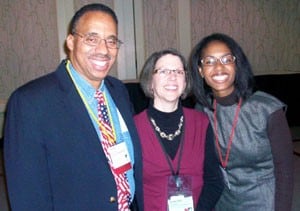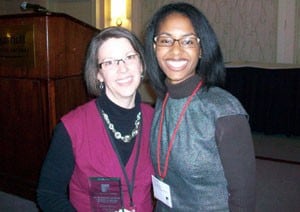Stewart Earns Mentor of the Year National Award
Dec. 15, 2009 | Without the airtight bond of a rock-solid mentor, Brooke E.E. Montgomery would not be the diligent graduate student or blossoming public health researcher she’s been groomed to become. “In fact, I wouldn’t even be the person I am today without the life and academic lessons I’ve learned,” said Montgomery, who is on course to earn a doctorate in health promotion and prevention research in May 2010 from the Graduate School at the University of Arkansas for Medical Sciences (UAMS). The program is housed in the Department of Health Behavior & Health Education at the Fay W. Boozman College of Public Health (COPH) at UAMS. So when an opportunity presented itself to pay tribute to her mentor, Montgomery acted on yet another of the lessons she learned and quickly seized it. She wrote a heartfelt letter nominating her mentor, Katharine E. Stewart, Ph.D., M.P.H., associate dean for academic affairs and associate professor of health behavior and health education in the COPH, for a “Mentor of the Year Award.” And while the pair attended the Compact for Faculty Diversity’s annual Institute on Teaching and Mentoring conference in October in Arlington, Va., it was announced that Stewart had won. “It’s a tremendous honor to receive this award and I am deeply humbled,” Stewart said. “I’m so proud of Brooke and how far she’s come as our relationship blossomed over the years. I have a lot of respect for Brooke and look forward to building on our relationship both professionally and personally in the future. It’s a pleasure working with Brooke every day.” The Compact for Faculty Diversity is a partnership of regional, federal and foundation programs that focuses on minority graduate education and faculty diversity. More than 650 student/mentor pairs attended the annual event. Stewart has mentored Montgomery in several aspects of her studies, but largely with a focus on the social and economic barriers faced by members of disenfranchised communities. For example, they are collaborating on a project focusing on substance abusers and how those barriers affect aspects of their sexual health. And Montgomery was Stewart’s research assistant on a National Institute of Drug Abuse grant used to study cocaine users in the Delta. “Our discussions have shaped my dissertation project, my future research aspirations and my personal perceptions about the world around me,” Montgomery said. “The concepts that I discuss with Dr. Stewart help me appreciate the importance of community-based participatory research and to understand the ongoing need to strive towards cultural competency and cultural sensitivity both personally and professionally.” |

